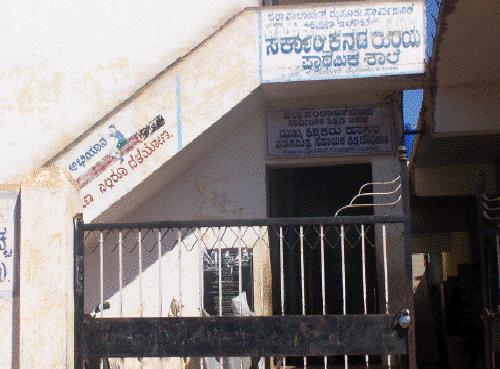I am very happy to provide new information about the library that you helped fund in Mysore, India.
Justin and Jan did a presentation about the project at Bibliotekartag 20012 in Hamburg, Germany Thursday 24 May at 12.30 PM – Here is a little more about what the focus of the presentation was: Why the story of Buy India a Library is (still) important
We have received a report on the status of the project and I am telling you this is AWESOME. I will hand the microphone to Florence form the organisation Good Gifts. Good Gifts are in charge of all the practical stuff.
/Jan
The Buy India a Library Project – The Library Itself

The Library funded by the Buy India a Library Project is being established in the Government Higher Primary School, in Gousiyanagare, Mysore district, Karnataka, southern India. The school has 820 pupils, from classes 1 to 10.
Our partner in Mysore has been working since 1984 for the development of people living in slums, street children and child labourers. It reaches out to 50,000 people in 56 slums and 20 villages in Mysore, Mandya and Chamrajnagar districts. Its aim is to empower the marginalised poor to live a dignified life through collective action for regaining human rights and building sustainable community development.
The library project took off from a humble beginning, procuring books and storing them in boxes in the absence of bookshelves. Books were also circulated among the poor people in slums, particularly to encourage parents to support their children’s reading. These modest steps were greeted with such enthusiasm that it was decided to expand the project to establish furnished libraries in government schools.
The libraries are open to all of the pupils in the school. Each library holds around 2000 books, both fiction and reference books to help with school work and for wider learning. Children can use the reading rooms, as well as borrowing books to take home. After a year, in which the school will be given advice and training in book keeping and record maintenance, the library will be handed over to the school, so that they can continue to run the library successfully themselves.
Background:
In India, people in the slums and villages have little opportunity for reading. Although there are public libraries in the district headquarters, these facilities are utilized by very few people, with only the highly educated or affluent class benefitting.
Most of the children in slums and villages go to government schools. In principle, most government schools do not have library facilities. An exclusive place meant for books, with furniture for children to sit and read, is a rare sight in these schools. Even in the classroom, books are few and far between, and huge classes make it even harder for pupils to get their hands on them. Most parents are illilerate, so there is often little support for reading habits at home. There is therefore an urgent need to renovate and modify classrooms to provide facilities for a library space.
Why Promote Reading Habits:
Reading is essential for children. It helps them develop initiative, originality and character, as well as providing varied entertainment and invaluable knowledge. Reading also opens up new possibilities and instills good values, laying the foundation for a better tomorrow.
Strategy for Sustainable Libraries:
The library project aims to address problems of lack of quality education in the government schools by developing reading habits among the children and thus widening their world of knowledge.
To ensure the libraries are embraced by both children and parents in the long run, the project focuses on:
- Building rapport with school children, teachers, community members and SDMC (School Development and Monitoring Committee) members.
- Forming library committees comprising eight members including children in each of the selected schools and equipping with the knowledge to manage a library.
- Selecting schools in slums and villages based on the criteria of need and situation analysis.
Each library will have an appointed coordinator who will monitor its function and ensure its proper use. They will also be responsible for organising various programmes to encourage the children’s reading habits.

#1 by Bhakti Gala on June 5, 2012 - 5:58 am
This is a big thank you from an Indian for the sincere efforts and interest shown. I just happened to read about it. Is it possible to replicate this in more remote areas in India- ready to help in any way.
#2 by janholmquist on June 18, 2012 - 9:40 am
Dear Bhakti Gala
Thank you for your comment. We chose the location in cooperation with goodgifts.org who have the expertise on location. If you have knowledge that can help them in their great work the right way to work for your area would be to contact them – I would also be interested if you do – You can reach me at janholmquist [at] gmail .com
#3 by Ari Katz on November 13, 2017 - 6:38 am
Hi, just saw your lecture at SJSU. Curious how the library is doing these days. Can you post an update? Thanks!